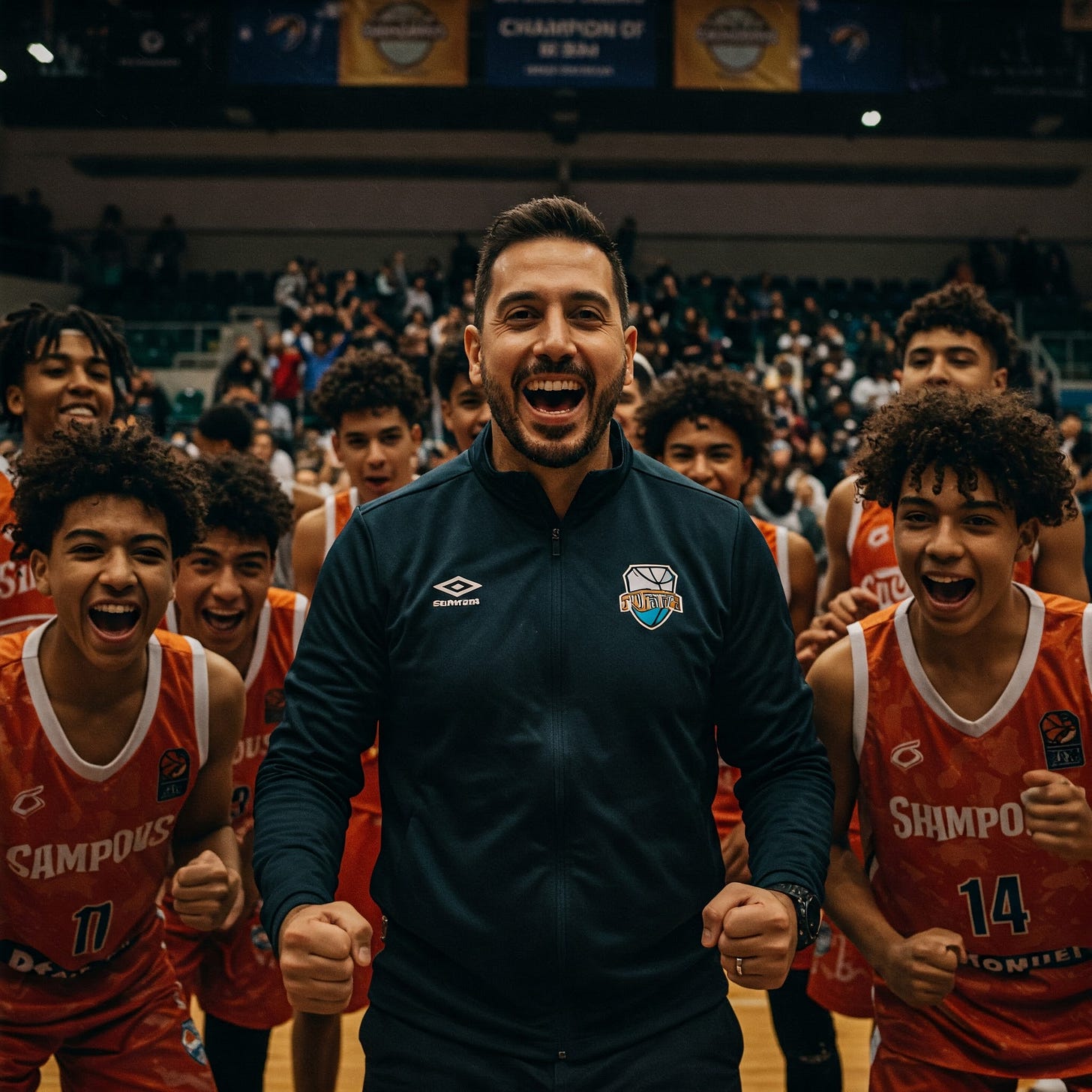How Preparation and Doing the Work Create Luck (Faith Based Version)
Elevate your team's potential through creating luck by preparing and doing the work. Expert advice, practical strategies, and inspiring stories delivered to your inbox. Free!
What We’re Discussing In This Issue
The Opening Line From Jim and Jason.
A Special Message from Division 1 Basketball Coach Adam Short
Champions of Change: Coach Armando's Story of Preparation and Perseverance
In the Spotlight: Preparation and Doing the Work Create Luck
The Reality Check: Redefining Luck
Deep Dive: Getting to the Roots of Why Preparation and Hard Work Are Undervalued in Youth Sports
The Toolbox: Practical Strategies for Cultivating Preparation and Work Ethic
Game-Changing Quote: Elevate Your Coaching with this Week's Wisdom
The Joy of The Game: A Lesson in Preparation and Hard Work
The Opening Line From Jim and Jason
Coaches,
It's March, the month where the madness begins! But before you get caught up in the frenzy of the tournament, let's take a moment to focus on a fundamental principle that often gets overlooked in the pursuit of victory: preparation.
This month, we're not just talking about drills and game plans. We're diving deep into the mindset of preparation, the relentless pursuit of excellence that separates those who dream from those who achieve. We're exploring how consistent effort, focused training, and unwavering commitment create the foundation for "luck" and unlock the true potential within every athlete. As it says in Proverbs 16:3, "Commit your works to the Lord, and your plans will be established."
So, join us as we break down the myths surrounding luck and reveal the power of preparation. Let's equip our athletes with the tools and the mindset to create their own opportunities, to seize their own victories, and to become the champions they were born to be.
Ready to join the movement? Let's do this together.
Not your thing? No hard feelings. Click unsubscribe at the bottom of the newsletter.
Let's make this year our best yet!
Jim & Jason
A Special Message from Division 1 Basketball Coach Adam Short
In youth sports, the power of a consistent routine cannot be overstated. Just as an athlete trains their body, they must also train their mind, and routines are the cornerstone of mental discipline. Adam Short says that routines provide a framework for young athletes, reducing decision fatigue and creating space for focus and growth. A well-structured routine helps athletes manage stress, improve time management, and develop essential habits that translate to success both in sports and life. In the words of 1 Corinthians 9:25, "Every athlete exercises self-control in all things. They do it to receive a perishable wreath, but we an imperishable." Let's instill in our athletes the understanding that preparation honors God and lays the groundwork for success in every area of their lives.
Champions of Change: Coach Armando's Story of Preparation and Perseverance
Coach Armando never had the most talented teams. Year after year, other schools in the district boasted rosters stacked with future college prospects, leaving Armando with the "scrappy" kids, the ones who had to work twice as hard for half the recognition. But Armando saw something special in these players – a hunger, a grit that couldn't be taught. He knew that with the right mindset and relentless preparation, they could defy expectations, for as it is written, "I can do all things through Christ who strengthens me." (Philippians 4:13)
He built his program on a foundation of hard work and discipline. Practices were intense, focused on fundamentals and execution. But Armando knew that preparation went beyond the court. Echoing the importance of spiritual law, he emphasized that true success encompassed more than just the physical. He instilled the importance of academics, stressing that education was a key to unlocking opportunities beyond basketball. He encouraged his players to set goals, to develop time management skills, and to prioritize their personal growth, reminding them that their bodies were temples.
Film sessions were meticulous, dissecting every opponent's weakness and exploiting every advantage. He instilled in his players the belief that preparation wasn't just about physical skills; it was about mental toughness, resilience, and unwavering commitment. Drawing from the power of the spoken word, he taught them to visualize success, to embrace challenges, and to never give up on their dreams. Armando fostered an environment where players understood that "faith is the substance of things hoped for, the evidence of things not seen" (Hebrews 11:1).
The results weren't immediate. The team faced setbacks, endured tough losses, and battled through moments of doubt. But Armando never wavered. He reminded his players that every obstacle, every challenge, was an opportunity to learn, to grow, and to become stronger. He shared stories of successful athletes who had overcome adversity through perseverance and dedication, inspiring his team to keep pushing forward, knowing that "in due season we shall reap, if we faint not" (Galatians 6:9).
Then, something remarkable happened. The team started to gel. Their hard work began to translate into victories. They developed a reputation for outworking and outsmarting their opponents. They became known as the "Cardiac Kids," pulling off improbable comebacks and defying the odds.
By the end of the season, Armando's team had not only exceeded expectations but had also earned the respect of their rivals. They had proven that preparation wasn't just about winning games; it was about building character, developing resilience, and creating their own luck, understanding that true success comes from aligning with a greater purpose and trusting in the Divine Design.
Coach Armando's Playbook: A Guide to Preparation and Perseverance
In the Spotlight: Preparation and Doing the Work Create Luck
Before we get swept away in the frenzy of buzzer-beaters and bracket-busters, let's take a timeout to focus on a fundamental truth that often gets overshadowed in the pursuit of victory: Luck is not a lottery ticket; it's a strategy.
We've all heard the tales of Cinderella teams making improbable runs, of underdogs defying the odds. But what if those "lucky" outcomes weren't just a matter of chance? What if they were the result of countless hours of sweat, dedication, and a relentless pursuit of excellence? As it says in James 2:17, "So also faith by itself, if it does not have works, is dead."
This month, we're not just talking about X's and O's or mastering the pick-and-roll. We're diving deep into the heart of preparation, the unwavering commitment that separates contenders from pretenders. We're exploring how consistent effort, focused training, and a refusal to cut corners create the foundation for "luck" and unlock the true potential within every athlete.
Think of it like this: every early morning workout, every extra shot taken after practice, every film session analyzing opponents – these aren't just isolated actions; they are the building blocks of a champion's mindset. They are the bricks that pave the path to greatness.
March is a month where dreams are realized and hearts are broken. But amidst the madness, remember this: luck may play a role, but it's the prepared mind that ultimately prevails.
So, join us as we debunk the myths surrounding luck and reveal the power of preparation. Let's equip our athletes with the tools and the mindset to create their own opportunities, to seize their own victories, and to become the champions they were born to be. For as Colossians 3:23 reminds us, "Whatever you do, work heartily, as for the Lord and not for men."
The Coach's Guide to Creating Champions Through Preparation
The Reality Check: Redefining Luck
We hear about "Cinderella stories" and "lucky breaks," but the truth is, those fairytale endings are rarely spun from thin air. They're woven from the fabric of preparation, dedication, and a relentless pursuit of excellence. As Proverbs 21:5 tells us, "The plans of the diligent lead surely to abundance, but everyone who is hasty comes only to poverty."
Here's the reality that often gets buried in the bracket predictions:
High dropout rate: 70% of kids quit sports by age 13. The journey to greatness is paved with challenges, setbacks, and the occasional heartbreak. It's about pushing through the tough times, learning from mistakes, and never losing sight of the goal.
Long odds: Only 1 in 7,000 high school athletes make it to the pros. The odds may seem daunting, but they're not designed to discourage. They're a reminder that the true value of sports lies not just in reaching the pinnacle, but in the growth, resilience, and character built along the way.
Intense pressure: Student-athletes face 3x more pressure to perform than non-athletes. This pressure can be a double-edged sword, fueling both ambition and anxiety. It's our responsibility as coaches to create a supportive environment where athletes feel valued for their effort and commitment, not just their wins.
Mental health challenges: Nearly half of student-athletes battle overwhelming anxiety. Mental toughness is just as vital as physical prowess. Let's equip our athletes with the tools and support they need to navigate the mental challenges of competition and life beyond the game.
Let's rewrite the narrative. Let's teach our athletes that luck isn't a mysterious force; it's a byproduct of preparation, perseverance, and a refusal to be defined by the odds. Let's empower them to create their own luck, one rep, one drill, one game at a time. As we are told in 2 Timothy 2:15, "Do your best to present yourself to God as one approved, a worker who has no need to be ashamed, rightly handling the word of truth."
Deep Dive: Getting to the Roots of Why Preparation and Hard Work Are Undervalued in Youth Sports
Preparation is often overlooked in youth sports, not because it lacks value, but because there are factors that make it harder to prioritize. Here’s a research-backed breakdown of why this happens—and how we can shift the focus back to sustainable development.
The Instant Gratification Trap (Cognitive Bias)
The brain’s dopaminergic system prioritizes short-term rewards, making viral sports highlights and overnight success stories far more appealing than slow, steady progress. This skews expectations, leading young athletes to underestimate the effort behind long-term achievement.
Shift Needed: Reinforce delayed gratification by tracking small, measurable improvements over time rather than highlighting major wins, aligning with the principle of sowing and reaping in Galatians 6:9.
Fear of Failure & Fixed Mindset (Developmental Psychology)
Athletes who develop a fixed mindset often avoid challenges, seeing failure as a threat rather than a step toward growth. Without psychological safety, they choose easier paths over the hard work of preparation.
Shift Needed: Reframe failure as feedback, rewarding effort over outcome to instill resilience, echoing the teachings on perseverance and learning from mistakes in James 1:2-4.
Lack of Structure & Habit Formation (Behavioral Psychology & Family Systems Theory)
Training success depends on structured routines, yet many young athletes lack consistent environments for preparation. From a family systems perspective, unstable home dynamics can further disrupt self-discipline.
Shift Needed: Build predictable, repeatable habits to make preparation an automatic behavior, emphasizing the importance of order and discipline in 1 Corinthians 14:40.
Outcome-Obsessed Coaching & Parenting (Social Learning Theory)
Athletes mirror what’s rewarded. When winning is prioritized over development, preparation becomes secondary. Despite $19B spent on youth sports annually, burnout and dropout rates remain high—evidence that effort-based growth is undervalued.
Shift Needed: Change the success metric from wins to consistent improvement and skill-building, focusing on the process rather than just the outcome, as highlighted in Philippians 3:14.
These factors create a perfect storm that devalues preparation in youth sports. If we want to fix this, we must intentionally build structures that reward effort, create psychological safety around failure, and model sustainable preparation habits—not just in training but in the messages we send to young athletes every single day.
This is the foundation of sustainable success in sports and life.
The Toolbox: Practical Strategies for Cultivating Preparation and Work Ethic
Let's explore some practical strategies for cultivating a culture of preparation and hard work in your athletes:
Set Clear Expectations and "Ends Goals": Clearly define your expectations for training, practice, and competition. Set "Ends Goals" – ambitious yet achievable long-term objectives that provide a clear vision of where the athlete is heading. These Ends Goals should inspire and motivate, serving as a guiding light for their journey. In line with Habakkuk 2:2, "Write the vision; make it plain on tablets, so he may run who reads it."
Provide Consistent and Constructive Feedback: Offer regular feedback on athletes' performance, highlighting both areas of improvement and progress. Focus on effort, technique, and decision-making, not just outcomes. Encourage a growth mindset by framing feedback as opportunities for learning and development. As Proverbs 27:17 states, "Iron sharpens iron, and one man sharpens another."
Teach Time Management and Organizational Skills: Help athletes develop effective time management strategies to balance their sports commitments with academics, social life, and other responsibilities. Provide tools and resources for planning, prioritizing, and staying organized. Emphasize the importance of being a good steward of time, as taught in Ephesians 5:15-16.
Create a Challenging but Supportive Environment: Foster a culture where athletes are encouraged to push their limits and step outside their comfort zones, while also feeling supported, valued, and respected. Emphasize the importance of teamwork, sportsmanship, and a positive attitude. Encourage a community that bears one another’s burdens, as mentioned in Galatians 6:2.
Lead by Example: As a coach, you are a role model for your athletes. Demonstrate a strong work ethic, commitment to preparation, and a passion for the sport. Be punctual, organized, and dedicated to your own continuous improvement. Remember, 1 Timothy 4:12 says, "Let no one despise you for your youth, but set the believers an example in speech, in conduct, in love, in spirit, in faith, in purity."
Incorporate Mental Training: Integrate mental skills training into your coaching practices. Teach athletes techniques for managing stress, building confidence, and maintaining focus. Encourage them to visualize success, practice mindfulness, and develop a growth mindset. As Philippians 4:6-7 advises, "Do not be anxious about anything, but in everything by prayer and supplication with thanksgiving let your requests be made known to God. And the peace of God, which surpasses all understanding, will guard your hearts and your minds in Christ Jesus."
Celebrate the Process: Recognize and celebrate the effort, dedication, and commitment that athletes demonstrate throughout their journey. Acknowledge their progress, highlight their achievements, and emphasize the importance of the process over solely focusing on outcomes. Give thanks in all circumstances, for this is the will of God in Christ Jesus for you (1 Thessalonians 5:18).
By implementing these strategies, you can create a team culture that values preparation, hard work, and holistic development, empowering your athletes to achieve lasting success both in and out of sports.
Simple Strategies to Ignite Your Team's Fire
Game-Changing Bible Verse: Elevate Your Coaching with this Week's Wisdom
"I can do all things through Christ who strengthens me." - Philippians 4:13
Why we like it:
This quote from the Apostle Paul encapsulates the source of true strength and success. It's a powerful reminder that our abilities are not limited by our own power but by the limitless power of Christ within us.
We love this quote because it shifts the focus from self-reliance to reliance on God, acknowledging that with Him, all things are possible. It's a call to trust in His strength, to persevere through challenges, and to approach every endeavor with faith and confidence.
The Joy of The Game: A Lesson in Preparation and Hard Work
Be sure to prepare your halftime speeches like this!
Bibliography (Links all updated to abstracts or reports)
1. Schultz, W. (2007). Multiple Dopamine Functions at Different Time Courses. Annual Review of Neuroscience, 30, 259-288. Link to Abstract
2. Loewenstein, G. (1996). Out of Control: Visceral Influences on Behavior. Organizational Behavior and Human Decision Processes, 65(3), 272-292. Link to Abstract
3. Dweck, C. S. (2006). Mindset: The New Psychology of Success. Random House.
4. Clear, J. (2018). Atomic Habits: An Easy & Proven Way to Build Good Habits & Break Bad Ones. Avery.
5. Bowen, M. (1978). Family Therapy in Clinical Practice. Jason Aronson.
6. Bandura, A. (1977). Social Learning Theory. Prentice-Hall.
Overview of Social Learning Theory
7. Aspen Institute. (2022). State of Play 2022: Trends and Developments. Aspen Institute Sports & Society Program.






